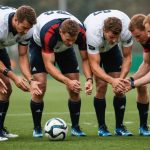Sleep patterns play a pivotal role in muscle recovery. Adjusting these patterns can enhance healing, reduce fatigue, and improve athletic performance. Disruptions to sleep can impact recovery times and overall physical health. By recognizing the significance of good sleep hygiene and exploring strategies for improvement, you can unlock your body’s potential. Discover how targeted adjustments to your sleep routine can become a game-changer in your recovery process and fitness journey. Ready to boost your gains with better rest? Let’s get started!
The Science of Sleep and Muscle Recovery
Understanding the connection between sleep and muscle recovery is crucial for athletes and fitness enthusiasts. Sleep is divided into several stages, each playing a unique role in recovery. During deep sleep, growth hormone release peaks, aiding in muscle repair and regeneration. This stage is vital for the body's recovery processes, allowing tissues to heal and muscles to grow stronger.
Topic to read : Unlocking Focus: The Effects of Mindfulness Meditation on Workout Concentration
Research studies underscore the importance of sleep quality in muscle repair. Studies have shown that poor sleep can impair protein synthesis and slow down recovery, leading to decreased athletic performance. Conversely, good sleep quality enhances muscle recovery, allowing athletes to perform at their best.
The duration of sleep also significantly impacts athletic performance. Insufficient sleep can lead to increased fatigue, reduced endurance, and a higher risk of injury. Athletes who consistently get adequate sleep tend to have better reaction times, improved coordination, and enhanced overall performance.
This might interest you : Unlocking the Power of Mental Imagery: Enhance Your Muscle Conditioning Effectiveness
Incorporating healthy sleep habits into a training regimen can be as important as the exercise itself. Prioritising sleep not only boosts muscle recovery but also supports overall well-being and athletic success. Understanding these dynamics can help athletes optimise their recovery and performance.
Practical Strategies for Optimizing Sleep Patterns
To optimize sleep patterns, athletes must consider several practical strategies that can significantly enhance their muscle recovery and overall performance.
Creating a Sleep Schedule
Establishing a consistent sleep schedule is crucial in optimizing sleep patterns. Going to bed and waking up at the same time every day, even on weekends, helps regulate the body's internal clock. This consistency in sleep times improves sleep quality and ensures that athletes enter the deep sleep stages necessary for effective muscle recovery.
Pre-Sleep Routine
Developing a calming pre-sleep routine is another effective strategy. Engaging in relaxing activities, such as reading, meditating, or taking a warm bath, can help signal the body that it's time to wind down. Avoiding screens and bright lights before bed is also essential, as they can interfere with the production of melatonin, a hormone that regulates sleep.
Sleep Environment Adjustments
Creating an optimal sleep environment can make a significant difference. A cool, dark, and quiet room promotes better sleep quality. Investing in a comfortable mattress and pillows, along with blackout curtains or a white noise machine, can further enhance the sleep-friendly space. These adjustments support the body's natural sleep cycle, leading to improved recovery and performance.
Physiological Benefits of Quality Sleep
Quality sleep is essential for hormonal regulation, which plays a critical role in muscle recovery. During deep sleep, the body releases growth hormones, facilitating tissue repair and muscle growth. This hormonal activity is pivotal for athletes, ensuring their bodies recover and strengthen after intense physical activity.
Furthermore, sleep is intricately linked to immune function. Adequate sleep supports the immune system by promoting the production of cytokines, proteins that help fight off infections and inflammation. This immune boost is crucial for athletes, as it reduces the risk of illness and allows them to maintain consistent training schedules.
In addition to physical benefits, sleep significantly impacts cognitive function and performance. Proper rest enhances memory, decision-making, and focus, all of which are vital for athletic success. Athletes with quality sleep experience improved reaction times and better strategic thinking, giving them a competitive edge.
In summary, the benefits of quality sleep extend beyond muscle recovery. It supports hormonal balance, bolsters the immune system, and enhances cognitive abilities, all of which are essential for peak athletic performance. Prioritising sleep is, therefore, a key component in an athlete's training and recovery strategy.
Healthy Sleep Habits for Athletes
Developing healthy sleep habits is essential for athletes aiming to enhance their performance and recovery. By focusing on nutrition, stress management, and strategic napping, athletes can significantly improve their sleep quality.
Nutrition and Sleep
Certain foods can promote better sleep quality. Consuming foods rich in tryptophan, such as turkey, nuts, and seeds, can enhance sleep by boosting serotonin production. Additionally, magnesium-rich foods like spinach and bananas help relax muscles and nerves, facilitating restful sleep. It's advisable to avoid caffeine and heavy meals close to bedtime to prevent sleep disruptions.
Managing Stress and Anxiety
Managing stress is crucial for achieving quality sleep. Techniques such as deep breathing exercises, progressive muscle relaxation, and mindfulness meditation can effectively reduce pre-sleep stress. These practices calm the mind and prepare the body for restful sleep, which is vital for muscle recovery and overall well-being.
Incorporating Naps
Napping can be a beneficial strategy for athletes. Short naps, lasting 20-30 minutes, can boost alertness and performance without interfering with nighttime sleep. To maximise benefits, athletes should nap in a quiet, dark environment and avoid late-afternoon naps to maintain a consistent sleep schedule.
Barriers to Quality Sleep
Athletes face several barriers to sleep that can hinder their recovery and performance. Identifying these common disruptors is the first step toward overcoming them.
Common Sleep Disruptors for Athletes
Athletes often struggle with irregular sleep schedules due to training, competitions, and travel. This inconsistency can disrupt the body's natural circadian rhythm, leading to poor sleep quality. Additionally, the physical and mental stress of intense training can make it difficult to relax and fall asleep.
Strategies to Overcome Technology-Related Sleep Issues
Technology is a significant barrier to sleep, with screens emitting blue light that interferes with melatonin production. Athletes can mitigate this by using blue light filters on devices or avoiding screens altogether before bedtime. Establishing a tech-free zone in the bedroom can also promote a more restful environment.
The Effects of Travel and Competition on Sleep
Travel and competition introduce unique challenges, such as jet lag and unfamiliar sleeping environments. Athletes can prepare for these disruptions by gradually adjusting their sleep schedules before travel and using sleep masks or earplugs to block out disturbances. Prioritising a consistent sleep routine, even when on the road, is crucial for maintaining quality sleep.
Expert Recommendations for Sleep Optimization
For athletes seeking to enhance their performance, expert sleep recommendations are invaluable. Leveraging insights from sports scientists and sleep specialists can provide a comprehensive approach to sleep optimization.
Insights from Sports Scientists
Sports scientists emphasize the importance of sleep consistency. According to their research, maintaining a regular sleep schedule enhances recovery and performance. They also highlight the significance of sleep duration, suggesting that athletes aim for 7-9 hours per night to facilitate optimal muscle recovery and cognitive function.
Recommendations from Sleep Specialists
Sleep specialists focus on creating a conducive sleep environment. They recommend maintaining a cool, dark, and quiet bedroom to promote better sleep quality. Additionally, they advise athletes to engage in calming pre-sleep routines to signal the body to relax. Avoiding caffeine and heavy meals before bedtime is also crucial for uninterrupted sleep.
Case Studies of Successful Athletes
Real-life examples demonstrate the impact of these practices. Several elite athletes have publicly shared how adhering to expert sleep recommendations has transformed their recovery and performance. By prioritizing sleep, they have experienced improved endurance, reduced injury rates, and enhanced overall well-being. These case studies underscore the practical benefits of integrating expert advice into daily routines.
Visual Aids and Infographics
Visual aids, such as infographics, offer a clear and engaging way to understand the intricate relationship between sleep and recovery. These tools can simplify complex information, making it more accessible and easier to digest.
An infographic on sleep stages and their benefits can illustrate the various phases of sleep, from light to deep sleep, highlighting how each contributes to muscle recovery and overall well-being. For instance, deep sleep is crucial for growth hormone release, which facilitates tissue repair.
In addition to sleep stages, visual representations of sleep hygiene tips can be beneficial. These infographics might include simple illustrations of a consistent sleep schedule, a calming pre-sleep routine, and an optimal sleep environment. Such visuals can serve as quick reminders of best practices for enhancing sleep quality.
Furthermore, a summary of research findings on sleep and recovery can be effectively conveyed through infographics. By visually representing data on how sleep quality impacts athletic performance, these aids can underscore the importance of prioritising sleep in training regimens. Infographics not only educate but also motivate athletes to adopt better sleep practices by showcasing the tangible benefits of improved sleep.











